The Ballad of Java Jive continues ... read part 1 here

Sonny Day performing at Java Jive, Pompallier Terrace, Ponsonby. - Diana Edwards Collection
“The Java appealed to us,” Jan Breukers said, “because once we heard it was for sale, I had been self-employed most of my life, and unemployed at the time, and Kristine knew she was the ideal people person. And with our experiences from Holland, adding it all up, it was an easy choice to make.”

Jan Breukers
In late May it was revealed that the neighbouring Gluepot had been sold and would close its doors for good that Labour Weekend. Many feared it would take the wind out of Java Jive’s sails but, as far as Breukers was concerned, there was no effect. Java Jive was by now its own entity.

A Java Jive newsletter prepared by then-owners Jan and Kristine Breukers on the eve of the closure of The Gluepot, September/October 1994. - Jackie Dobson collection
“The so-called overflow from The Gluepot was a phenomenon that lived more with the people that lived in the past, talking about how good it was at The Pot [sic],” he said. “It was always brought up, yet we never noticed it as such. Over time we noticed, however, we became more a bar with live entertainment. Maybe that was a consequence, but it was not noticeably an instant side-effect.”
What was baffling to the Breukers was an apparent unwillingness on the part of some Auckland musicians to work together to see the venue flourish. Breukers admitted he did at times come across as confrontational, “but that was concept driven; the concept that we were all in it together!
“We struggled with the fact that the restaurant part of the business, and licence, was losing ground, and the fact that there was a shift in general, where people wanted to dine later, and that conflicted more and more with the time the entertainment was supposed to start or insisted on starting. Some performers showed hardly any respect or even understanding for diners, and that is not something we were used to from overseas.”
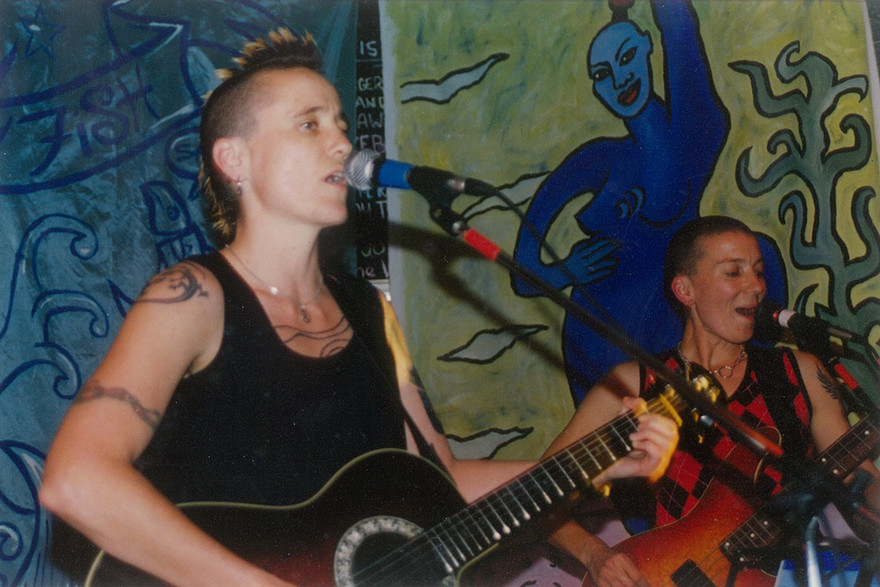
Frankie Hill and Kāren Hunter, Raw Fish Salad, Java Jive, Auckland 1997. Paintings by Jo Russ and Megan Oliver.
Breukers approached Kāren Hunter to host a women’s open mic night on Tuesdays. She said she would if it could be the kind of open mic night you might encounter in the likes of New York or Berlin. She called it Raw Fish Salad after a conversation with several girlfriends to see if they could come up with the most outrageous name.
“Jan was so easy to work with on all the planning and the running of the night,” Hunter said. “He was a wonderful sort of protector of what we were doing. I remember, for example, being onstage and having people trying to harass us and he would just move people. He’d just pick people up and put them outside and say, ‘Don’t come back.’ It was a really racy thing that we were putting on and he was really progressive.”
Guitar competitions and jam sessions on Thursday nights were always good for a crowd. However, sponsors didn’t always come through, like the time Jimi Hart won a singer-songwriter competition but the $3000 guitar that was the advertised first prize never eventuated. Jansen Sound was always a worthy ally when it came to offering prizes.
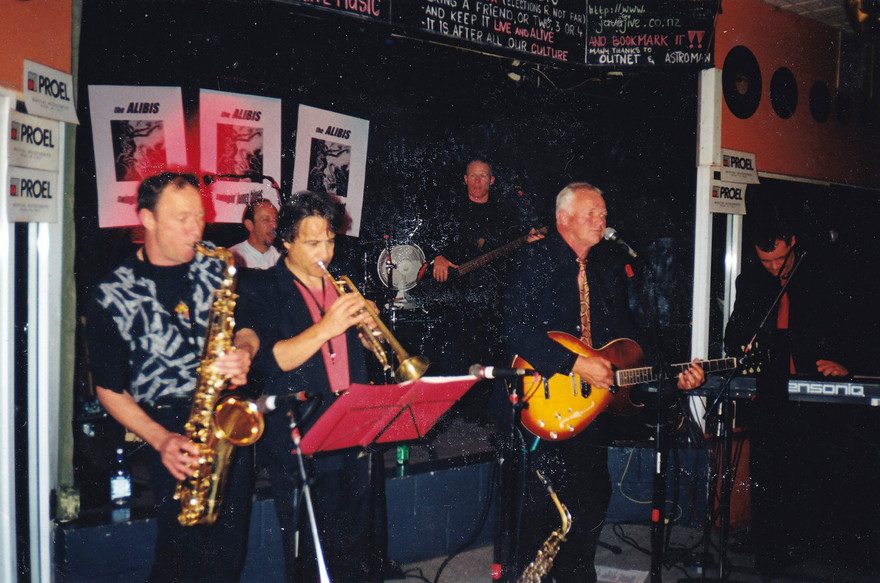
The Alibis performing at Java Jive. - Diana Edwards Collection
The weekends were busy with a roll call of musicians who “understood the business as a whole” including Mark Heke, Rob Galley, Johnny Kempt, JT (John Tuala), Rick Bryant, Billy TK, Tama Renata, Jono Lonie, Red McKelvie, and The Alibis. Monday and Wednesday nights were troublesome no matter what was tried, and the country jam night was nixed – too many line dancers and water drinkers.
Two other long-running favourites came to an end. Shayn Wills put the blues jam on notice after a barred female patron was manhandled out the door and an ugly melee broke out on the stairs. He quit soon after. Polynesian a capella group CMB Swing were fired after a fight in the car park where Breukers claimed they accused the owners of being racist. “That happened only once in all my life,” he said. “I remember it well.”
Gospel singers The Blind Boys of Alabama got so much press bringing pot into the country, they could have sold out a whole week of engagements, and Australian guitarist Tommy Emmanuel was a consistent crowd puller. Japanese power trio Guitar Wolf brought their own audience for an impromptu show when their Kings Arms engagement was shut down due to noise complaints.
According to Breukers, there were some issues with the King Cobras street gang in the mid 1990s that involved bomb threats to the venue and threats on Jan and Kristine’s lives.
There was also drama after a blown-out Paul Ubana Jones gig. On a mini tour, Jones had added Hammond Gamble and raconteur Gary McCormick for the Java Jive show and sent through venue-specific posters. When Jones and entourage arrived for the Friday night gig, it transpired the posters had arrived late and had not been distributed. Much shouting ensued and Jones and his pals stormed out the door.
“Had they not caused a scene but instead had suggested ‘Let’s do this again sometime and prove to you guys that it is not us to blame,’ that could have prevented a lot of BullScheisse,” Breukers said. “But no! That appeared impossible. They preferred an escalation on the night and have yelled and screamed it off the rooftops ever since!”
The following evening, rock writer John Dix popped into a packed Java Jive for a nightcap with his long-time neighbour Nari Felix, chief of chiefs of the King Cobras. While Felix found a friendly corner, Dix queued at the bar where he cheekily suggested to Breukers, “I don’t think it’s a good idea to get offside with a media heavyweight like Gary McCormick.” The interaction earned Dix a bluey, warning him to stay off the premises.
A week or so later, Jan and Kristine had a meeting with Nari Felix. John Dix declined to attend. “Nari did show and after some good coffee and conversation he understood our position, and from that moment on we had cleared the air between us and all of the KCs,” Breukers said.
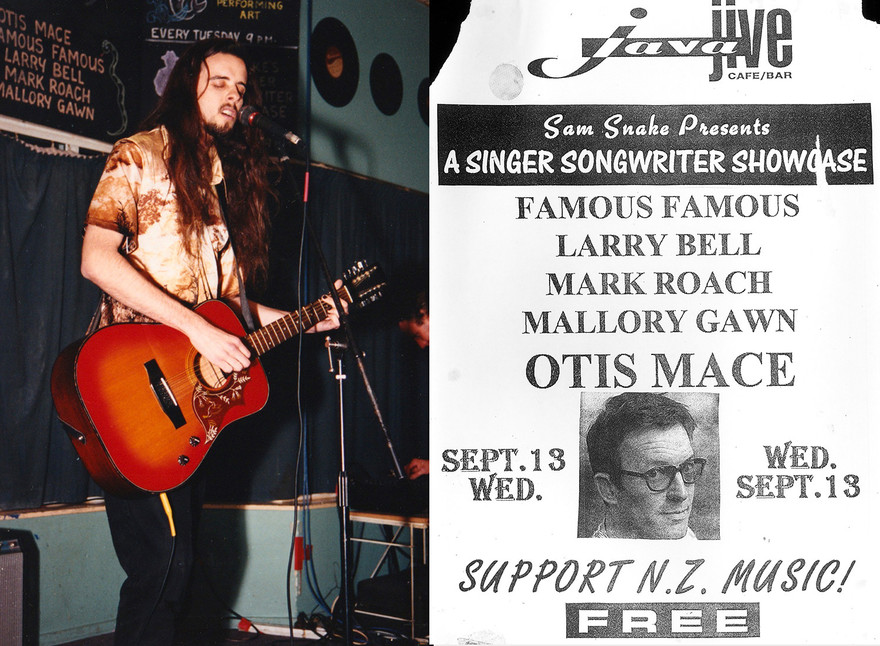
Mark Roach at Java Jive, 13 September 1995. - Mark Roach Collection
Before long, Dix had returned too. “I’ve always figured that if any business didn’t want a slice of my not insubstantial entertainment budget, I’ll take it elsewhere,” he said. “About two to three months later, Jan dispatched Rob Galley with a peace offering, which I accepted. The music biz is too small for enemies.”
Meanwhile, the big windows behind where the bands played were removed, creating a drum riser out of what used to be the corridor to the car park, and a low stage was installed in front of it. A couple of walls received a lick of paint in a hue that has been described as both terracotta and womb pink!
After the America’s Cup Village slowly but surely took away 45 percent of Java Jive’s business – of which only 20 percent was recovered afterwards – Jan and Kristine Breukers decided it was time to get out. But not without one final eventful night on Saturday 6 November 1999, that ended with Jan’s arrest.
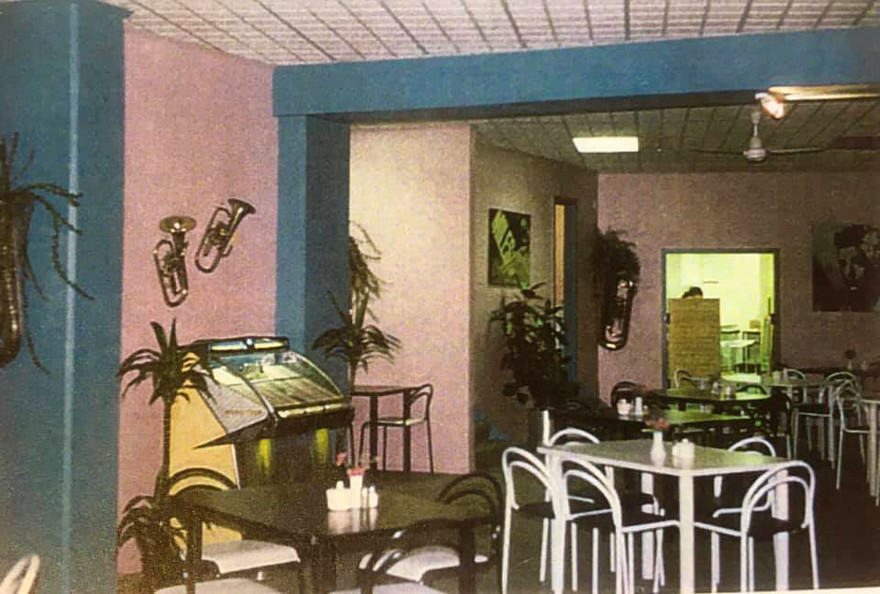
Interior of Java Jive, Pompallier Terrace Ponsonby.
A private party of about 60 was sending the owners off when Noise Control warned him at 11:30pm that the music was too loud. An hour later, seven police cars arrived, officers stormed the stage, and Breukers and country singer Tim Werry were arrested for obstruction.
Breukers believes a disgruntled musician was behind the initial noise complaint. “A grudge it must have been, because the music was acoustic that night, no drums, no bass, no percussion. 14 cops at Java Jive, for noise complaints? Several noise complaints? For what again, acoustic guitar? Solo performers?”
But he now looks back at his time in charge with affection. “Some of us, all people involved, suffered an ego clash here and/or there. They can blame us, maybe still do, but we no longer blame them. We have moved on! It always – for me, for sure – will be an unforgettable experience, with fond memories outweighing by far the managerial decisions we had to make at times that caused bad blood with those involved.”

New owner Diana Edwards and musician Mike Scorey at the top of the stairs leading to Java Jive Café, Pompallier Terrace, Ponsonby. - Diana Edwards collection
There was an air of excitement when industry veterans Diana and Neil Edwards took ownership in November 1999. Diana had for years run Rock It Promotions, including a year as Breukers’ entertainment manager, while Neil Edwards was Neil Edwards, ex-Underdogs, ex-Human Instinct, ex-Headband, writer of ‘The Ballad of Jacques Le Mere’, session musician, good guy.
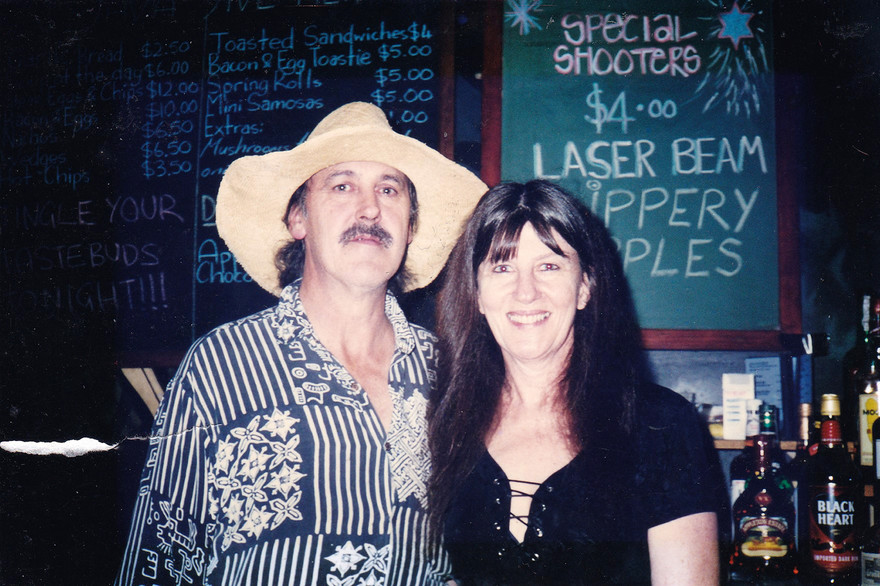
Neil and Diana Edwards, Java Jive. - Diana Edwards collection
One of the first things they did was organise a “painting bee” thanks to drummer Neil Williamson and bass guitarist Tony Baird to change the terracotta/womb pink walls back to a shade of blue that best represented the bluesy Java Jive atmosphere.

Barry Saunders at Java Jive with Caroline Easther (drums) and Alan Norman, 1998. - Diana Edwards collection
In January 2000, they hosted a crammed benefit concert for terminally ill guitarist John Kristian, a former Larry Morris co-writer who had spent time with The Action, The Dallas Four and with Edwards in The Kybo Glyderz. When a frail Kristian stumbled as he stepped onto the stage, Tom Sharplin called out, “Do you need a leg up, John? I’ve got a spare one in the car.”
Paul Ubana Jones put the Java back on his circuit and bluesman Shayn Wills made a return with a Wednesday night jam. When LeAnn Rimes played New Zealand in 2003, one of her musicians called Java Jive to check if their jam night was “authentic with nothing bullshit like drum machines”. Assured there were real musicians and real instruments, they appeared post-concert and jammed into the morning.

The original line-up of The Christine White band at Java Jive in the early 1990s. Left to right: White, Bryce Sholson, Dylan Marriott. The band had three drummers in its history – Sholson, Willy Scott and Mike Tan – all of whom played at the Java during the 1990s. - Christine White collection
Singer-songwriter Christine White, whose band had cut their teeth at the Java during the Paul Walker days, put her stamp on Tuesday nights until it was decided to cut back to five nights a week. “After a few months, we realised that we couldn’t sustain seven nights a week with Neil working full-time in aircon and me running the business of Java and trying to keep Rock It Promotions afloat, so we decided to close the bar on Mondays and Tuesdays to give us some breathing space,” Diana Edwards said.
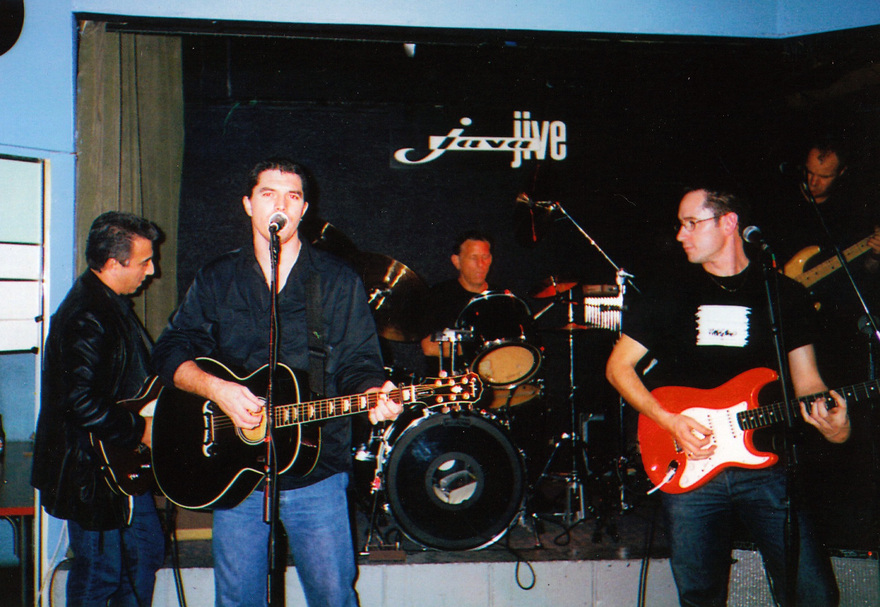
Glen Moffatt’s Java Jive Café farewell, 2002. Left to right, Rob Galley, Glen Moffatt, Ricky Ball, Chet O’Connell, Neil Hannan.
Country jam night was reinstated on Sundays with me, Neil Hannan on bass, Gordon Joll on drums and Rob Galley on guitar. It felt great to be home. When we stepped aside after a year, Brendon Ham and Back II Basix continued.

Hammond Gamble and band at Java Jive with Neil Edwards on bass. - Diana Edwards Collection
As for other nights, American acts such as Eugene “Hideaway” Bridges, Diane Ponzio and folk-rocker David LaMotte breezed through, and Australian Jeff Lang was a hit. Local stalwarts included Hammond Gamble, Midge Marsden, Rick Bryant, Sonny Day, The Hipshooters, Neil Edwards’ Red House Rockers, and the rakish Ritchie Pickett.

A Ritchie Pickett showcase at the Java Jive country jam, Sunday 5 June 1994. During a later appearance, an evicted patron kicked in the door behind him from the outside, spraying glass all over Pickett’s keyboard. He just played on. Left to right: Pickett, Jeremy Dart, Jono Lonie, Murray Pomare, Glen Moffatt, Cameron Miller. - Glen Moffatt collection
“Of course, we must make mention of the inimitable Ritchie Pickett,” Diana Edwards said, “who caused a riot every time he played, with his ribald, wicked humour and complete lack of filter where nothing and no one was exempt from his acerbic tongue.”

Ritchie Pickett in defiant mood at the Java Jive Café, Auckland, 1993 - Photo by Billy Lawry
Demand was such that a Human Instinct reunion had to be extended to two nights, while a re-formation of sorts of the classic Underdogs line-up of Neil Edwards, Murray Grindlay and Lou Rawnsley, with early drummer Ian Thomson and guest guitarist Martin Winch, was part of original Underdog Archie Bowie’s massive 60th birthday celebrations. “According to Martin, it was a highlight for him as he’d always wanted to be in The Underdogs,” Diana Edwards said.

An Underdogs reunion at original band member Archie Bowie’s 60th birthday celebration at Java Jive, 30 April 2003. Left to right: Martin Winch, Murray Grindlay, Ian Thomson (rear), Neil Edwards, Lou Rawnsley. - Diana Edwards collection
On a tragic note, acclaimed blues singer-songwriter and guitarist Mike Farrell passed away on Saturday 20 May 2000, the morning after a truncated Java Jive gig. “I noticed that they were having a longer-than-usual break and asked Neil where Mike was,” Edwards said. “I found him on a chair in the car park just outside the stage door, in the throes of what appeared to be a heart attack. Ever the gentleman, he kept apologising for not being able to finish the gig. He insisted that he be taken home and not to hospital, and I feel he knew his time was nigh and wanted to die at home.”
Diana Edwards’ favourite gig was American roots legends and Grammy Award winners The Amazing Rhythm Aces’ two nights, supported by Rock It Promotions success story James Ray Still, on 2 and 3 September 2002. “It was exciting liaising with [bass guitarist/manager] Jeff “Stick” Davis in the States via email and organising their fairly specific list of demands from the brands of cymbals, drums, keyboards, amps and most especially monitors, to what they wanted in the green room in the way of beverages,” she said.
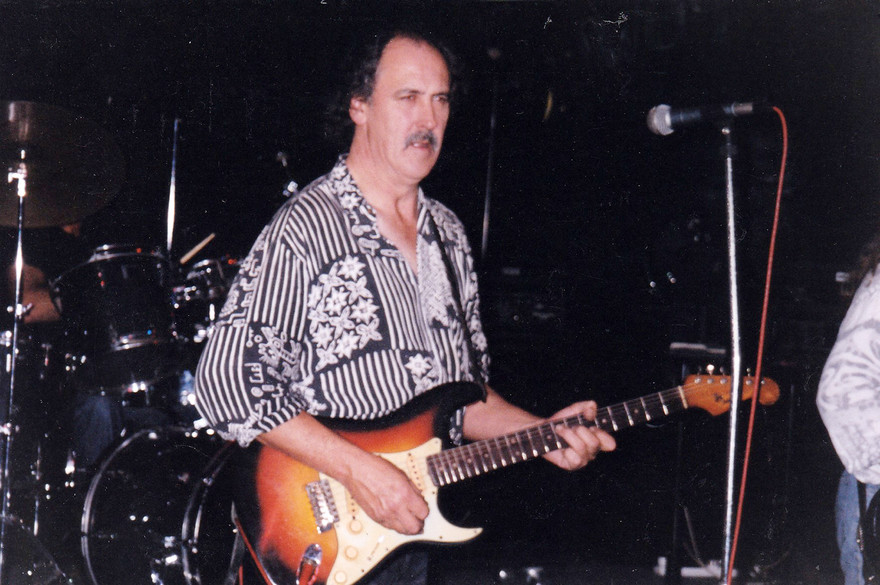
Neil Edwards performing at Java Jive. - Diana Edwards Collection
“It blew me out that so many musicians were willing to lend gear from the shops they worked in or managed, for the price of a couple of tickets. Murray Hancox supplied Billy Earheart’s keyboard needs, and Drum City were amazing with dropping off the required drum-kit brand requested and picking up said kit after the shows were over. The requested amps were also supplied for a couple of tickets. It was so heartening to have that kind of help from the local industry and something that I shall never forget.”
But by September 2003, there wasn’t enough money coming in to justify Neil and Diana continuing. Their involvement on a television show dedicated to helping struggling businesses had brought no positives and they decided to sell.
“The big nights were winners, but the quiet nights were killers,” Diana said. “Neil and I bought the bar in 1999 and, yes, because we both had decent reputations and knowledge of the industry, we felt we could make it work. The plan was to make enough money from the bar for Neil to stop working in the aircon industry, but sadly, as we found to our detriment, buying ‘bad will’ makes for a hard row to hoe.”

Indie rock band Crash performing at Java Jive, Pompallier Tce.
By all accounts, schoolteachers Peter and Rosalind Hardcastle had good intentions to continue as a music venue, but quickly realised the effort was beyond them. They closed Java Jive with a party and auction of memorabilia on Saturday 31 January 2004 and reopened as the All Nations Tavern with an open mic night on Tuesdays and a white wall where Martin Page’s magnificent mural once was.
“It’s a sad day in some respects, but, you know, from the ashes something great may rise,” Peter Hardcastle told Suburban Newspapers Auckland reporter Phil Taylor. A few years later, what had risen was a $2 shop which still stands there today.
Days after the closing-down party, Java Jive founder Chris Priestley found out about the auction. “When it actually finally closed, it was Truda Chadwick who said, ‘Oh, they had an auction last week and they sold all your stuff,’” Priestley said. “And I was thinking, ‘Oh, shit, why didn’t someone tell me? All my records, all my tubas, my photos.’ I mean, I didn’t need them; it was probably just as well that it happened that way. They probably went for a bloody song.”

Dancing at Java Jive, Pompallier Terrace, Ponsonby. - Diana Edwards Collection
On a personal note, I look back and think how lucky I was to have been part of that Java Jive scene for nearly five years. As a full-on music joint, the place was magical under Paul Walker and Mike Gin’s stewardships, but a change of management style under Jan and Kristine Breukers quickly followed by the end of The Gluepot made for turbulent times in the second half of the 1990s.
Walker’s business partner Julian Spiller summed it up best: “Those sorts of places usually are based on the person who’s running them, aren’t they? You can’t sell that.” Unfortunately, by the time Neil and Diana Edwards took over at the end of the decade, the horse had practically bolted.
But over its nearly 18-year existence, Java Jive had some spectacular musicians and bands pass through. An incomplete list of those not already mentioned might read Julian McKean, Mike “Snapper” Knapp, Bruno Lawrence, Kim Paterson, Evan Silva’s ReAction, Move To Groove, Kim Robertson (aka Joan Wayne), Jesse Wilde, The Housemovers, Percy Robinson, Hattie St John, Harpo Max and Blues Attacks, Jo Speed, Mumbo Gumbo, Ted Brown and The Italians, Janis Ian (yes, Janis Ian), Alex Moffat, Cartoon, Bernie Griffen, Cat Tunks, Southside Of Bombay, Billy Hood and The Sidewinders, Ronnie Taylor, Kokomo Blues, Dave Alley …
--